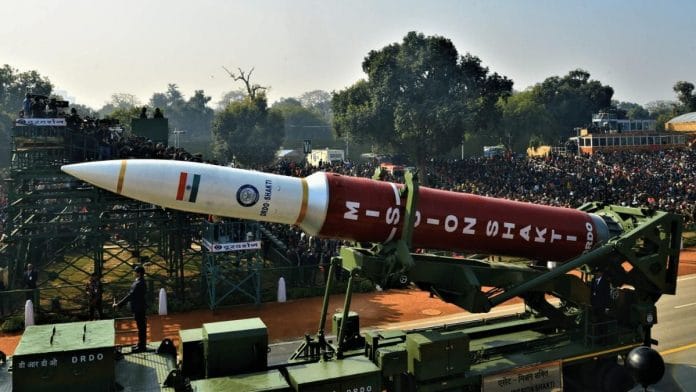The last frontier in physics has opened up applications of combat across all spectrums, so much so that “Space is a domain which is enhancing capabilities of other domains of land, sea, air and even cyber. The military application of space is the dominant discourse from which we cannot remain divorced,” said Chief of Defence Staff Gen Anil Chauhan. His observations followed the recent announcement of the Indian Space Policy, 2023 by the Cabinet Committee on Security. That a seemingly business-oriented and pacific policy is announced by the CCS is a reflection of how important a domain space has evolved to be.
In a remarkable situational adjustment, Gen Chauhan provided some vital inputs on veterans’ welfare at the long-awaited 31st Kendriya Sainik Board meeting on 11 April. And on the same day he addressed the next challenges of warfare in the inaugural session of the Indian DefSpace Symposium organised by the Indian Space Association (ISpA). This is ultimately how this combat domain is going to evolve, and the essence of the proceedings was about using space for greater situational awareness. The Defence Research and Development Organisation (DRDO) chief Samir V Kamat also stated that his organisation has increased its focus on the space domain.
The new frontier
The ISpA seminar brought together public and private players active on the space front. This included the pioneering body Indian Space Research Organisation, along with DRDO and still nascent Defence Space Agency (DSA). The event is part of deliberations under ‘Mission Def-Space’, under which 75 challenges have been identified for development by the industry, said Lt. Gen. A. K. Bhatt (retd), Director-General, ISpA, the industry association of space and satellite companies. As former Director-General of Military Operations, Lt. Gen. Bhatt is aware of the military utility of space as a domain and the assets deployed there, as elaborated by the CDS.
“There’s a requirement to safeguard our assets with counter space capabilities. We must build resilience and redundancy in a space-based infrastructure,” Gen Chauhan said. The counter-space capability required for the objectives stated above is far more than the anti-satellite accomplishment demonstrated by India on a defunct low-earth orbiter on 27 March 2019. Most domestic analysis tends to believe that a successful demonstration of capability is deterrence enough, but the space domain is far bigger than that, as are the current and future challenges. Chinese counter-space capabilities, currently the only likely threat, are unequally placed in favour of Beijing. And they are growing.
The challenge posed by space-based platforms, and even the commercially available ones, was vividly observed when Ukraine made deft use of the SpaceX and Maxar technologies for combat. A challenge every professional military person must acknowledge as the CDS said, “the invasion of the space domain by commercial enterprises, as seen during the Russia-Ukraine conflict by SpaceX and Maxar, had unfolded a new area in the war on convergence…This combined with the intense race towards militarisation of space has resulted in the battlespace becoming expanded and the very nature of warfare is at a major cusp of transformation.”
In such a situation, it behoves on the military and political authority to invest in organisations that truly stand up to the challenges posed by the frontier as it fast approaches India. In some ways, it is already upon us. The DSA, headquartered in Bangalore, is the premier tri-Service organisation handling space matters, but as things stand it is a work in progress. India’s space-based military assets are limited in number and use, while the challenges are enormous. For starters, a doctrine is needed.
Also read: Cutting troops in Kashmir shows Delhi will pay for holding force but not assault-capable Army
Leveraging space power, Deccan Plateau
Which should be a joint service effort for the current and anticipated threat perceptions? The 2017 Joint Doctrine as released by the Headquarters of the Integrated Defence Staff (HQ IDS) is prescient when it comes to space matters. ‘Emergence of space power is analogous to conventional land, sea or air power that will mark it out as a ‘Revolution in Military Affairs,’ the doctrine reads.
‘Space bestows immense force multiplication capability on the Armed Forces, and the dependence on space assets for military operation is rapidly increasing… Leveraging space power would include protection of our national space assets and exploitation of space to enable defence capabilities across the conflict spectrum,’ it adds.
The DSA should work with the training commands and perspective planning cells of the three Services to work out a new Mil-Space Doctrine for India. For this endeavour, as indeed for long-term futuristic research and development, the private sector enterprises and assets must become an essential part of DSA. And they should be functionally integrated. Warfare is indeed transforming and so should the structures and organisations to conduct that type of combat. It is possible: recruit from the vast tech resources available on the Deccan Plateau, give them a Territorial Army commission, and employ them for mastering the last frontier.
New challenges call for new solutions and this is easily workable. But without letting go of the age-old and ultimate military mace, the spectre of the Army Act, hanging overhead. It will be a deterrence against any potentially deviant ideas, while delivering on Def-Space missions. Which is currently one of the most serious Indian national security challenges.
Manvendra Singh is a Congress leader, Editor-in-Chief of Defence & Security Alert and Chairman, Soldier Welfare Advisory Committee, Rajasthan. He tweets @ManvendraJasol. Views are personal.
(Edited Ratan Priya)






